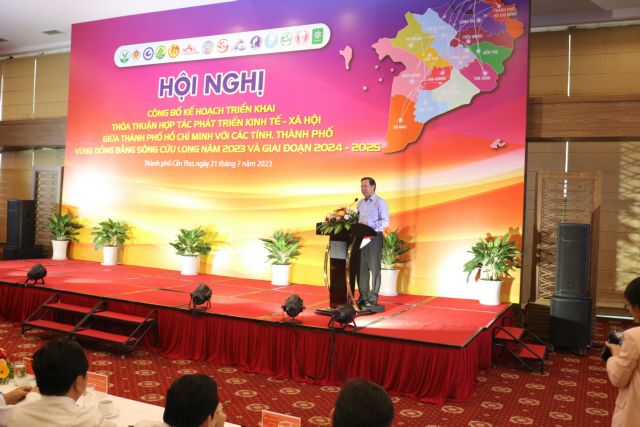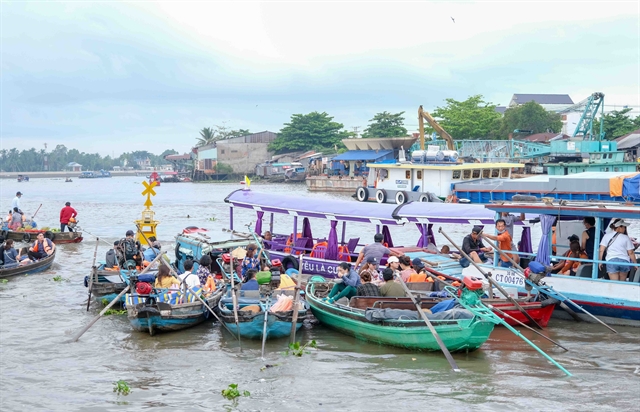 Society
Society


|
| Phan Văn Mãi, chairman of HCM City People’s Committee, speaks at a meeting last Friday in Cần Thơ City. Photo courtesy of the HCM City Investment and Trade Promotion Centre |
CẦN THƠ — HCM City and the Cửu Long (Mekong) Delta region have the potential for significant cooperation in various sectors such as agriculture and aquaculture, tourism, infrastructure development, education and research, and climate change adaptation.
Speaking at a recent conference in Cần Thơ City, Phan Văn Mãi, chairman of the HCM City People’s Committee, said the cooperation holds significant potential for “economic growth, social development, and resource optimisation.”
By leveraging their respective strengths, sharing expertise, and synergising efforts, this partnership can create a “sustainable and prosperous future” for both regions and the entire country, he said.
The collaboration would also pave the way for optimised resource utilisation, improved connectivity, enhanced educational opportunities, and a healthier environment for all.
“As economic, social, and infrastructural dynamics evolve, this collaboration sets the stage for a brighter future for the regions in southern Việt Nam,” he noted.
To avoid overlapping and inconsistencies, Mãi proposed building a complete set of investment documents.
As for agriculture and aquaculture, experts said the fertile lands of the Mekong Delta make it Việt Nam’s “rice bowl”, offering immense agricultural potential.
Meanwhile, HCM City, as a major urban centre, can facilitate the supply chain and marketing of agricultural products, support farmers and promote domestic and international trade, they said. HCM City can also assist in transferring technology and knowledge to enhance agricultural productivity and diversify crops in the Mekong Delta.
The city and the region recently signed a socio-economic cooperation agreement, which serves as a platform for collaboration and growth.
Trần Văn Dũng, vice chairman of Tiền Giang Province’s People’s Committee, said the province has a large land fund available for industrial development. It has also been a major supplier of fruits and vegetables for the HCM City market over the years.
The province plans to establish a specialised medical cluster with a total area of 30 hectares, and hopes that HCM City will help introduce potential investors to the province.
Nguyễn Văn Hiếu, secretary of the Cần Thơ Party Committee, emphasised the importance of strengthening transportation connections, developing industry, and creating economic opportunities in the region.
Cooperation in transportation infrastructure is vital because HCM City and the Mekong Delta are connected by waterways and road networks, he said, adding that enhancing transportation connectivity between these regions will facilitate the flow of goods and people, promoting trade and tourism.
Projects such as the expansion of expressways and railways will boost investment, reduce transportation costs and time, and enhance socio-economic development, he noted.
Tourism is another sector with significant potential for collaboration. The Delta region offers lush green landscapes, fertile rice fields, and a rich cultural heritage, while the city provides a bustling urban experience, historical sites, and modern entertainment options.
By promoting joint tourist itineraries, both the city and the region aim to attract a broader range of tourists and prolong their stays. The combination of cultural and urban experiences, along with the natural beauty of the Mekong Delta, provides a unique and unforgettable experience for tourists.
In addition, the city and provincial officials have pointed out that addressing climate change and ensuring sustainable development are pressing issues for both the city and the Mekong Delta.
Rising sea levels, extreme weather events, and salinity intrusion pose significant challenges to the region's agricultural and rural areas. By collaborating on climate change adaptation strategies, both regions can implement measures to protect vulnerable communities, develop resilient infrastructure, and promote sustainable practices, they added.
Digital transformation is another agenda, with a focus on utilising technology to enhance administrative procedures, e-governance, and digital connectivity.
HCM City has made significant progress in digital transformation, and there is an opportunity for the Mekong Delta to learn from its experience. By embracing technology, both regions can enhance administrative procedures, improve connectivity, and create a more efficient and transparent governance system.
Huỳnh Chí Nguyện, vice chairman of Bạc Liêu Province’s People’s Committee, said the province wants to strengthen cooperation in healthcare, education, and human resource training with HCM City.
By pooling resources and expertise, HCM City and the Mekong Delta can improve educational facilities, provide better healthcare services, and develop skilled human resources to meet the demands of the evolving economy.
Nguyễn Minh Luân, vice chairman of Cà Mau Province’s People’s Committee, suggested HCM City and each locality in the Mekong Delta region should have at least a major annual activity to promote cooperation.
The Mekong Delta, known as Việt Nam’s agricultural hub and renowned for its large seafood exports, encompasses Cần Thơ City and 12 provinces. — VNS

|
| Cái Răng Floating Market in Cần Thơ city’s Cái Răng District. Tourism is a major sector with significant potential for collaboration between HCM City and Mekong Delta. VNA/VNS Photo |




